

Charles Besley Gribble - first minister of St Paul's Church for Seamen
(1847-58)
Gribble was a member of a nautical family, from Barnstaple in Devon, with Cornish connections as well.
His father
also
named Charles Besley Gribble (1774-1831), was a captain in the
Honourable East India Company, and later a Commander of the Fleet. He
met Napoleon on St Helena in 1816. Earlier in his career, in the wake
of the French Revolution, he was one of the signatories of this
letter (Burke & Dodsley's Annual Register vol 50 (1820) p287)
to a Chinese official in Quang-tong [Guangdong], and Quang-si [now
Guangxi, an autonomous region], near present-day Hong Kong,
explaining that their purpose was trade and not belligerence:
|
To his Excellency the Viceroy of Quang-tong and Quang-si May it please your Excellency, WE the undersigned, commanders of the hon. English East-India company's ships at Whampoa, for ourselves, our officers, and our men, have the exalted honour to acknowledge the receipt of your excellency's most gracious letter, delivered to us on French Island, on the 4th Dec. 1808, by the two mandarins, whom we are informed it was your condescending pleasure to send for that purpose. Our object in visiting this country is purely commerce, to continue in the same manner that friendlyand useful intercourse which has existed for centuries, and now become, from its magnitude, of the very first importance to both our vast empires. We are taught in our own country, that obedience to our laws is the first essential to the well-being of the state; the same principle must apply to all countries, and we are therefore ordered, and endeavour, to venerate and obey yours; but such is the nature of our own laws and constitution, that we dare not, even in a foreign country, depart from allegiance to our own country, nor to those who are dignified with its most exalted representation. We understand that our admiral, who is an officer of high rank, at the request of the Portuguese, landed some troops at Macoa, to help them to defend it, against attacks from the French. This wicked nation, ever since they murdered their sovereign, have waged war upon all nations within their reach, and we understand are now marching by land to make war upon the celestial empire, as the British navy prevent them by sea. We, of course, wish to have no concern with any disturbances in the celestial empire, and we therefore most humbly implore your excellency to order the trade to be opened, that we may thereby find employment in the quiet habits of industry, which we conceive would prevent our services being required for other purposes, but which, if called for, our laws and our honour, would compel us to obey, whatever might be the consequences. With sentiments of the most profound veneration, and prayers for your excellency's welfare, we beg leave to subscribe our names. Hon. Comp.'s Ship Elphinstone, Whampoa, 7th Dec. 1808. (Signed) M. CRAIG, Sen. Officer, C. E. PRESCOTT, WM. MOFFAT, H. MERITON, J. LOCKE, WM. DUNSFORD, R. H. BROWN, J. J. WILLIAMSON, C. B. GRIBBLE, LUKE DODDS, F. ARMITAGE (Chief Officer), for W. A. MONTAGUE |
He later became the the captain, part-owner and 'ship's husband' of the vessel Princess Charlotte of Wales, and after his death a Chancery case was unsuccessfully brought by the other owners against the bank with which he had deposited funds, backed by freight warrants (some of which he lent to his son Henry, also of the East India Company). The case, Sims v. Bond (1833) 5 Barnewall & Adolphus 389, and Lord Chief Justice Denman's remarks to the effect that a bank deposit is to be treated as loan, and cannot be recovered by others unless they can prove that the depositor was acting as an agent of the partnership, is still quoted in books on contract and partnership law.
Captain
Gribble ('of Calcutta and Madras' – some of his papers are
deposited at the National Archives in Kew) retired to Barnstaple in
1828, where he was made a 'Common Councilman'. According to a
relative Joseph Besley Gribble (Memorials of Barnstaple 1830, p356)
this was the first appointment of a nonconformist, in the face of the
provision that None to be admitted a free Burgess, but those that
are comformable to Church and State, and shall take the oaths of
allegiance and supremacie at the time of such their admittance (a
rule which he believed was originally intended to exclude Roman
Catholics). However, if he was
indeed a nonconformist, many of his descendants embraced the Church of
England.
Early career
The
Captain's namesake son Charles Besley Gribble (1807-1878) studied at
Christ's College Cambridge and was ordained deacon in 1839 by the
Bishop of Lincoln, to serve as Curate of Olney in Bucks (in those
days part of that huge, as yet undivided, diocese). Here in 1841 he
preached a sermon, which was published, Christ Glorified. When he
visited on his return from Canada in 1845, they produced a pamphlet The Happy Meeting, with a verse beginning When Christian
friends asunder part, Think how it grieves them to the heart -
hardly up to the standard of the famous Olney Hymns of Cowper and
Newton (including Amazing grace).
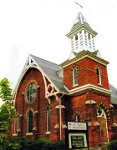 In
1841 he became a missionary with the Society for the Propagation of
the Gospel in Foreign Parts (SPG) to serve in the diocese of Toronto,
and went first to Lake Erie, then to Dunnville, near Niagara
Falls and the American border, working with the Revd Bold Cudmore Hill,
'Grand River Missionary'. A church was built a few years after his
departure, and the present church [right] in 1887.
In
1841 he became a missionary with the Society for the Propagation of
the Gospel in Foreign Parts (SPG) to serve in the diocese of Toronto,
and went first to Lake Erie, then to Dunnville, near Niagara
Falls and the American border, working with the Revd Bold Cudmore Hill,
'Grand River Missionary'. A church was built a few years after his
departure, and the present church [right] in 1887.
He was an Evangelical, opposed to
Tractarianism and taking the low church view in the controversies of
the day (and is listed as such by Curtis Fahey in In His Name: The
Anglican Experience in Upper Canada, 1971-1854 (1991) p281). In a
letter of 1 April 1842 [in SPG archives], in connection with the
founding of Trinity College [now part of the University of Toronto]
he wrote Our principles teach men to be good subjects on religious
grounds, the government will therefore do right to help forward our
principles. And they will therefore do what is expedient, for the
principles of the church, where followed up by a faithful clergyman,
beget humility and submission, order and peace. Here
is a very forthright tract delivered to local residents - what would
they have made of it? - castigating them for their wicked ways;
interestingly, 'Sunday fishing' is first on the list!
Although
he was an SPG man, it is recorded in the archives of the Church
Missionary Society (CMS) that he brought to Christ John Bowen, who
grew up on a farm in a wild and remote part of Canada and later became bishop
of Sierra Leone. However, as this link shows, Bowen was no rustic; he graduated from Trinity College Dublin as Doctor of Laws, and was a man of independent fortune; his seat is Milton House, Pembrokeshire, where he has considerable property. Unmarried, he funded CMS expeditions to the Middle East at his own expense.
Gribble returned from Canada in 1845 and served for two years as curate of St Jude's English Church in Glasgow. Charles Popham Miles, formerly chaplain of the Sailors' Home in Dock Street, was by then the incumbent there, so it was no coincidence that Gribble became the first minister of St Paul's Church for Seamen here. He thus became one of the quartet of evangelical clergy serving in this area who were in conflict with the Scottish Episcopal Church (the others were Sir William Dunbar, Alphonsus Rose and Charles Popham Miles): he published The Mistake Corrected (Bryce 1848), an extended letter to the Rev Dr Champneys, headmaster of the Collegiate School, Glasgow on the position of the English clergy in Scotland.
St Paul's 1847-58
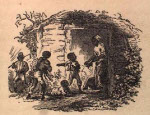 Gribble,
by now a widower, married Catherine Jackson, daughter of a
Commissioner of the East India Company, in Cornwall in 1848. While at
St Paul's he co-operated with the London City Mission, a
non-denominational agency founded by David Nasmith in 1835 of which
other Anglican clergy were suspicious. He was a committee member of
the National Society for the Preservation of
Life from Shipwreck, founded in 1824 (now the RNLI), and a
member of the British & Foreign Anti-Slavery Society, and
published a pamphlet Slavery a Sin; or Aunt Phillis' Cabin Reviewed
(Nisbet 1852). (The reference is to a pro-slavery novel of that name
by Mary Eastman, extolling the saintliness of
the 'black mammy' figure and the graciousness of white slave owners, and written in response to Harriet Beecher Stowe's
hugely-influential Uncle Tom's Cabin).
Gribble,
by now a widower, married Catherine Jackson, daughter of a
Commissioner of the East India Company, in Cornwall in 1848. While at
St Paul's he co-operated with the London City Mission, a
non-denominational agency founded by David Nasmith in 1835 of which
other Anglican clergy were suspicious. He was a committee member of
the National Society for the Preservation of
Life from Shipwreck, founded in 1824 (now the RNLI), and a
member of the British & Foreign Anti-Slavery Society, and
published a pamphlet Slavery a Sin; or Aunt Phillis' Cabin Reviewed
(Nisbet 1852). (The reference is to a pro-slavery novel of that name
by Mary Eastman, extolling the saintliness of
the 'black mammy' figure and the graciousness of white slave owners, and written in response to Harriet Beecher Stowe's
hugely-influential Uncle Tom's Cabin).
In the same year he published a sermon, preached at St
Paul's, The Burning of the Amazon, or Divine and Human Sympathy after a new Royal Mail steamship was destroyed by fire off the Scilly Isles, with great loss of life.
Lower Life in London, by George Perkins (1854) describes the lives of individuals in the Well Street area. On one occasion Gribble cared for two kidnapped sailors from the Friendly Islands, as this report from the Daily Southern Cross (vol V, issue 248 of 13 November 1849, page 2) reports:
Constantinople
1858-78
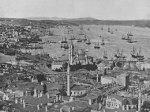
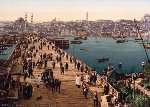 Gribble
left St Paul's to become Embassy Chaplain in Constantinople [pictured 1890 and early 20th century], where he served until his death off Malta in 1878. He was subsequently
appointed a Canon
of Gibraltar (at that time the titular base of Anglican mission in
Europe). In 1870 there was a disastrous fire at the Embassy.
Gribble
left St Paul's to become Embassy Chaplain in Constantinople [pictured 1890 and early 20th century], where he served until his death off Malta in 1878. He was subsequently
appointed a Canon
of Gibraltar (at that time the titular base of Anglican mission in
Europe). In 1870 there was a disastrous fire at the Embassy.
Sustaining the Protestant Christian presence in Turkey,
particularly in the capital city, became
important in the wake of the Crimean War, and much effort was put into
building good relationships, both for the sake of the expatriate
community and because of the symbolic significance of the area for Christian mission ancient and modern. The Chaplain was
soon to become involved in delicate negotiations with the Turkish
authorities, as this report by the Evangelical Alliance, in Evangelical Christendom (1861), p671, shows:
|
MEETING
ON BEHALF OF THE PROTESTANT COMMUNITY IN TURKEY. Having called upon the Rev. C. B. Gribble to open the proceedings with prayer, the Vekeel briefly addressed the meeting in Armenian, the Secretary translating his remarks to the following effect. Rev. Sirs, — We have invited you here today for the consideration of a matter of great importance; and I feel much obliged to each one of you for your kind acceptance of our invitation. The matter to be proposed to your consideration is the present financial state of the Chancery of the native Protestant community, over which I preside. I will, gentlemen, briefly explain how it is that, although this Chancery is wholly a civil establishment, yet the sole reason for its existence is the profession of the Protestant religion by subjects of this empire. On account of the particular form of Government exercised in this country, the professors of each different religion must be represented at the Sublime Porte by a separate president, otherwise they cannot enjoy any civil or religious right. According to this principle of the Turkish Government, the Protestant Chancery stands here to represent the Protestant religion, and to see that all professors of that religion, of whatever nationality they may be, fully enjoy all the religious and civil rights and privileges bestowed by the Government. Fifteen years ago no one could profess Protestantism without incurring open persecution from the chiefs of the Rayah communities, whether the Greek or Armenian Patriarch, or the Jewish Rabbi; now it is not so. Anybody may now profess Evangelical Christianity, and enjoy full protection. Our Chancery spends, for its four officers, about 60,000 piastres annually; and, as the committee appointed to inquire into the financial state of the Chancery will represent to you, our community can at present hardly contribute the half of this sum. For the other half, which is absolutely necessary in order to maintain the Chancery, we have no other resource to look to but the Protestant Christian churches — our co-religionists — who are, we believe, greatly interested in the Protestant movement going on in this country. We have, therefore, invited you here as representatives of almost the whole Protestant Christian world; and being confident that you will sympathise with our difficulties, and he interested in this matter. We shall now present the facts of the case to your kind consideration. The Secretary was then directed to read the statement prepared by the committee, the substance of which may be briefly expressed as follows: The office of the Protestant Vekeel, or president, is the only regular and recognised means of communication between the Turkish government and the Protestant community; the only means by which a Protestant can be protected in case of molestation or encroachment on his rights and privileges; in a word, but for its existence, nobody could in this land profess Evangelical Christianity, and enjoy the civil and religious privileges granted by the Sultan to his Christian subjects. This institution, however, unavoidably requires, and that with the strictest economy, au annual expenditure of 60,000 piastres, or less than 500l. The Protestant community, numbering at present rather more than 7,000 souls, of whom 1,600 or 1,000 may be liable to assessment, cannot, in its present circumstances, possibly raise the whole of the required revenue; because, first, they are generally poor. Secondly, they have, as a civil community, a great deal to expend for the transaction of their local civil affairs, in more than 120 places, which was unnecessary till their separation from their old communities. Again, they have a great deal to expend for religious and educational purposes, in which they are always prone to be considerably more interested. For instance, in Marash the Protestant community contributed, in 1850, 11,500 piastres for religious purposes alone, while for the Chancery they sent only 2,500 piastres. Besides these expenses, the people have to pay three different taxes to the Government, the amount of which is two or three times more than all their civil and religious and educational expenses put together. And once more, those who are indirectly persecuted by being deprived of employment, or being forsaken by their friends, for their adherence to Protestantism, must necessarily depend for help on the charity of their brethren — a not unfrequent occurrence. Taking into consideration these and other similar causes, we think that the inadequate support extended to the Chancery does not arise from any reluctance on the part of our people to perform their duty, but from their present circumstances, a change of which would soon enable them to support this establishment for themselves. Now, however, with a balance of 25,000 piastres already against the office, and with the certainty that the end of the year will exhibit a deficiency of 30,000 more, the Board of Representatives of the Protestant community is placed in a condition of painful embarrassment. Now, gentlemen, in coming to you to ask your advice in these, our difficulties, we feel convinced that you take as much interest in the existence and good standing of this Chancery as we ourselves do. And as Protestantism, in this country, still requires missionary sympathy and political protection, and as the Chancery is the means not only of protecting the personal interests of Protestants, but also Protestantism itself, we think it claims the earnest consideration and support of all who are desirous of seeing that religion take a firm stand in this great empire. We think the societies you represent will not refuse to help, and specially if they know that to have Protestantism properly represented at the Sublime Porte will greatly facilitate all missionary movements here. We believe that from year to year the revenue of the community will increase, and not very long hence it will be large enough to keep the Vekeel office in thorough working order. But, in the meantime, what is to be done? Can we look to you for the making up of the amount required? or if not, what advice would you offer in a matter which places us in such perplexity? It was then suggested that, as the substance of the facts now communicated had been stated by members of the American Mission some months ago to several of the missionaries present, and a short statement of them furnished for the purpose of being transmitted to several of the missionary societies in Britain and America, some report might possibly be now given of the result of that movement. In reply, the Rev. Mr. Weakly stated that on the personal application of Dr. Pfander, the committee of the Church Missionary Society had agreed to give 50l., on condition that the London Jews' Society, the Turkish Missions Aid Society, and the Society for the Propagation of the Gospel, should agree to give a similar sum; that application had accordingly been made to each of those societies, but that the only answer received had been from the Turkish Missions-Aid Society, and was to the effect that they were prepared to sanction the application of 50l. to this object out of the funds they transmitted to Turkey, provided such a course should be approved of by the American missionaries there. As it did not appear that the matter had ever been formally proposed to the American Mission, it was arranged that Dr. Riggs should take steps for that purpose, while the Rev. Mr. Gribble undertook to apply to the committee of the London Jews' Society, in the absence of any missionary from that body now in this city. Mr. Tien reported that the Rev. Mr. Curtis had applied twice to the committee of the Propagation Society, but without receiving any reply; while Mr. Tomory stated that the Free Church Jewish Committee had given 10l. last year, and were prepared to make a similar grant for this year. Mr. Thomson then stated that though, from the peculiar constitution of Bible societies, it had not been thought advisable to apply to either the British and Foreign, or to the American Bible Society, for aid towards this object, he was sure it would command the sympathies of all the true friends of those institutions. He himself had always regarded the Protestant Chancery with peculiar interest, not only for the sake of his excellent friend, the Vekeel, who presided over it, but as the material embodiment of the religious liberty which, through God's blessing, had been achieved for this country, chiefly through the influence of Lord Stratford de Redcliffe, but perhaps scarcely less so through the high moral character of the Protestant Armenians themselves, and the self-sacrificing constancy with which many of them had submitted to pecuniary losses in defence of their principles. To allow it to collapse would be to relinquish nearly all that had been gained by twenty years of labour, suffering, and representation to the Government, would reduce the Protestant Rayahs to their former bondage under ecclesiastical authorities, and deprive them of the only recognised medium of intercourse with the Government in any case of persecution that might unhappily arise in time to come. On all these grounds, and further, as it admitted accessions from every class and race of the subjects of the empire, whether originally Armenians, Greeks, Jews, or of any other race, he thought the maintenance of the civil organization of the Protestant community an object in which every society wae interested which was engaged in seeking the evangelization of this country. Mr. O' Flaherty and Mr. Tomory followed. The latter illustrated the practical value of the Chancery, by relating how it had shielded more than one Jewish inquirer from being immured in the madhouse by the Spanish Hacham-Bashi, or Chief Rabbi. After some conversation, the following resolution was moved by the Rev. Alexander Thomson, seconded by the Rev. C. B. Gribble, and unanimously agreed to, viz. : — This meeting, having heard the statement of the committee of the Protestant civil community, and being convinced that the maintenance of the Protestant Chancery is essential to the protection of the civil and religious rights and privileges of the Protestants of Turkey, as well as satisfied that it is conducted with all possible economy, Resolved, that the brethren here present do recommend it to the cordial support of the various religious bodies with which they are connected, and that until such time as the native Protestants shall be in circumstances to meet its expenses without foreign aid. (Signed) STEFAN SEROPIAN, Vekeel, President. |
In
1858 work began on a Memorial Church, just down the hill from the
Embassy Chapel, on land given by the Sultan. It took some years
to complete, because of disputes and the nature of the soil. Mrs C.F.
Alexander wrote a poem On the Laying of the First Stone of the Memorial Church at Constantinople by Lord Stratford de Redcliffe, 19 October 1858; a report of his speech said
|
The religious services on the occasion were conducted by the Rev. C. B. Gribble, Chaplain to the Ambassador, and by the Rev. G. C. Curtis, Chaplain of the Society for the Propagation of the Gospel. The following speech was delivered by Lord Stratford de Redcliffe. After some preliminary remarks, he said : — Its site was selected with reference to its object as a memorial, and we have only to look to the noble prospect now stretched beneath our eyes, in order to appreciate its fitness. A situation corresponding with the required conditions was not to be obtained without difficulty. It was thought, and justly thought, desirable that the sacred edifice should be prominently visible from the sea, that it should be easily accessible to the British residents of Galata, as well as to those who occasionally frequented that part of the harbour, and that it should at the same time be not inconveniently removed from the houses of our principal merchants in Pera. It was also to be borne in mind that the intended building would be of larger dimensions than those of any Protestant — certainly of any Anglican — place of worship hitherto erected in this neighbourhood. The increased demand and high value of ground for building brought the Turkish quarters into requisition, and, finally, there alone could the necessary site be found. The new church, as you perceive, will be in immediate contiguity with a mosque, and that unusual, if not unprecedented, circumstance is at once a proof of the difficulty and a sign of progress in the advancement of liberal ideas. We may now anticipate the time, apparently near at hand, when the British mariner, in approaching Constantinople from the south, will recognise among its first objects the tower of his country's church, and, welcomed by its appearance, lose the feelings of a stranger in the most endearing recollections. We may hope that his thoughts will rise in grateful acknowledgement to those who have subscribed the funds for its construction; to our gracious Sovereign, who heads their list with habitual benevolence; to her ally, the Sultan, who granted the site on which we are assembled; to those who, in various ways, have aided the progress of the work; and, above all, to that Great Being on whose protection and guidance we ultimately depend for its completion. Oh God, how full of wonder are thy ways! The tempest goes forth in destruction; but the skies are cleared by its appalling energy, and nature, soon reviving, repairs its ravages with increased fertility. War, which is but too often the tempest of human passion, is also an agent of destruction; but its course awakens our highest energies, and in its final consequences the hand of a wise and benevolent Providence may not unfrequently be traced. To that war which was lately an object of such intense anxiety to all of us during many successive months, we are indebted for the plan which our Memorial Church is destined to accomplish. The Sultan's grant of the land required for it is a link in the long chain of munificent concessions which have distinguished his reign. It is a part of that far greater and more comprehensive act of justice which crowned the results of the war, in so far as moral principles, apart from mere political questions, are concerned, by establishing liberty of conscience in religious matters throughout the Ottoman dominion. It was but natural that a triumph so interesting and beneficial to mankind, should spring out of that gigantic struggle of which the Crimea was the main battle-field, and which, originating in the vindication of national rights, was productive of sympathy and union between rival Powers and repulsive populations. It is not beyond hope that the same causes may continue to operate, and that the religion of Christ, the religion of peace, may spread far and wide its civilising influence, and ultimately realize, by its universal extension — I mean by the natural prevalence of truth and reason — hopes which I confess to be the most ardent desire of my heart. If, then, the war was productive of so much advantage to humanity, both in past and in prospect, we have the consolation to reflect that neither did they who fought and fell under the banner of its justice resign their lives in vain. Though it was not my duty or my fortune to share the toils and dangers of our gallant countrymen in the field, I can personally bear witness to the cheerful fortitude and truly Christian resignation displayed by those who had to endure even severer trials on the bed of sickness or under the surgeon's knife. Whether it was their lot to die or to survive, they nobly maintained their character alike on the deck as in the field, in the wards of the hospital as in the ranks of battle. Their exertions and sacrifices have, in truth, contributed powerfully to open the way for those unspotted acquisitions which no territorial aggrandisement can equal, and whose value is the more appreciated the longer it is enjoyed. Honour, unfading honour, be theirs! Honour assigned not only to the departed by their lamenting comrades, but to all by the consenting voices of an approving Sovereign and an applauding nation. Without distinction of class or rank, the names of those who fell will be engraven on the walls of that sacred edifice, the foundation-stone of which is now to be laid by my unworthy hands. Their achievements, so fruitful of good in all but their untimely end, will be long preserved in a more lively temple of glory — the memory of a loving people, confirmed and perpetuated by the records of a grateful age. Having delivered this speech, his lordship laid down in the foundations English and Turkish coins, and the following inscription, which was composed in England by the Committee of the Memorial Church : —
|
The following extract is from the Bishop of Gibraltar's Visitation in 1864 (page 50ff)
However, a different perspective, allegedly that of the British Consul, comes a few years later in Two Years of the Eastern Question, Antonio Carlo N. Gallenga (1877),
pages 260ff:
|
... I have suffered political considerations to divert me from the
subject of this present chapter, which I intended to devote exclusively
to the English colony on the Bosphorus. One of the things I should
like to call your attention to, said Sir Philip Francis, the English
Consul, to whom I was indebted for much useful information, is that we
are here rather over-parsoned, and proceeding to particulars, he
stated what I now will attempt to write down, quoting, as closely as I
can, his own words. I remember a good old English lady, whose home lay
in the centre of one of the most charming rural districts, and who yet
came to the resolution to leave the spot to which half a century of
wedded life had strongly attached her, for the only reason that she
could not live where she could not enjoy 'daily services and weekly
celebrations'. It might seem that any person acting under the impulse
of such laudable wants would not be easily induced to settle in
partibus infidelium, yet there is, perhaps, hardly a cathedral town in
England itself where my venerable friend could have better gratified
her devotional cravings than here on the Bosphorus, under the rule of
the Sovereign who calls himself 'head of the Mohammedan faith'.
Reckoning Stamboul and Pera, and all the various villages situated on
either shore of the Strait, the British and American population
averages about five hundred souls, and to minister to their spiritual
wants, it is hardly exaggeration to assert that we have fifty
gentlemen,
one in ten who go about in black coats and white neck-cloths, and whom
it would be ill manners not to designate by the much-disputed title of
'reverend'. First and foremost we have here in Pera the chaplain of her Majesty's Embassy, the Rev. C. B. Gribble, whose impressive delivery and sound doctrine edify a numerous but select official congregation; while for those whose leanings are towards the more demonstrative Ritualistic innovations there is the 'Memorial Church', a monument in good style erected in honour of the Crimean heroes, where Mr. Curtis, deeply versed in Byzantine Archaeological lore, regularly officiates; and we muster besides, Dr. Millingen, a Presbyterian minister, and Dr. Roller, a German by extraction, but ordained in England, and equally at home in an English and German pulpit. The Scotch have their own minister, Mr. Christie, of the Established, and Mr. Brown, of the Free Kirk. The Americans assemble under the auspices of a clergyman, Mr. Tomory, and they have besides a whole colony of preachers attached to their flourishing college at Boumeli Hissar and Bebek. The little flock at Kadikeui, near Scutari, are in the charge of Messrs. Elliot, Bliss, and Wood, the first-named English, the two others Americans - numerous enough, one would think, in proportion to their congregation, to hold a council in that hallowed locality the ancient Chalcedon renowned in olden times for its grand ecclesiastical gatherings. The British and American Bible Societies have, besides, their clerical establishments both at Galata and Scutari, and under the shadow of the Great Mosque at Stamboul; and at Hasskeui, the home of the Israelites, there is a Church of England missionary, Mr. Neumann, and a good number of other missionaries, with missionary schools for Jew boys and girls. |

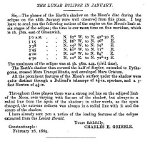 Astronomy
Astronomy
Throughout
his life Gribble (like his former curate at St Paul's Daniel Ace, and many other Victorian clergymen) was a keen amateur astronomer. His observations were
regularly printed in the local press. In August 1868 he wrote an account of The
Disappearance of Jupiter’s Satellites on the 21st of that
month; a few months later this letter was printed in the Levant Times [photograph from 1869].
Other family members
The Gribble family spread far and wide. There were various untimely deaths – including his first wife, and his son Charles (who died in Foochow aged 23). His brother Henry, a Captain in the East India Company, also lost his first wife Maria in 1829; he continued to serve in Bombay, where in 1849 he asked the local Geographical Society to lend or sell him a 'transit instrument' and any other astronomical equipment they might have to spare.
John Brown Gribble (1847-1893), from Cornwall, emigrated as a child to Australia in 1848 and became a Church of England missionary in Queensland, fiercely championing the Aboriginal cause, which despite his bishop's support broke him : see more details here. But many of his large family continued in missionary work; and one descendent became a general manager of the Australian railway system.
Bernard Finegan Gribble (1873-1962) was a noted marine painter, who it is said designed King George V's Christmas cards for some years; he exhibited at the Royal Academy and his picture The Doomed Fleet hangs in the Old Parliament House in Canberra. Two family members were authors – Francis (died 1956) and the crime writer Leonard (died 1985).
Back to Episcopal Floating Church | Back to St Paul Dock Street